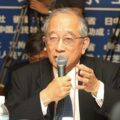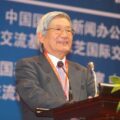Japan To Improve Relations With China Through Tenacious Dialogue

Okada Katsuya
I, as Deputy Prime Minister, will devote myself to create an environment in which Japan and China maintain calm communication in good spirits, thereby further deepening the “Mutually Beneficial Relationship Based on Common Strategic Interests” as the leaders of the two countries have agreed upon to date, and expanding exchanges between the two peoples.
Question 1: Confrontation between Japan and China has intensified after China reacted sharply to Japan’s purchase and possession of the Senkaku Islands. What prompted the Japanese government to acquire the Senkaku Islands at this time, and how do you assess the repercussion from China?
Okada: What I feel most strongly in the wake of this development is how difficult it is for Japan and China to communicate with each other, given the background of differences in their cultures and political systems. By the same token, the communication between the two countries is most important.
Japan and China, both responsible for peace and stability in Asia, must address the situation calmly without losing sight of the broad perspective of bilateral relations. To that end, tenacious and persevering dialogues are essential for improving relations between Japan and China. At least, both Japanese and Chinese governments should take any necessary measures not to hurt the feelings of, or rub each other the wrong way.
With that in mind, the Japanese government recently decided on the transfer of the ownership of three islets in the Senkaku group of islands as there was a possibility of the private owner selling them to the Tokyo Metropolitan Government, arousing concerns that they would be used solely for their own interests. Put another way, the Japanese government decided to purchase them to place the islands under peaceful and stable control for a long term.
One should be reminded that the Japanese government had owned these three islets until 1932. Now the ownership of them has been returned to the government again by the private owner. In addition, the government has consistently retained ownership of another island (Taisho Island) in the Senkaku group. Thus, it is nothing new for the recent transfer of the ownership of these three islets.
It is highly regrettable that anti-Japanese protests occurred in various parts of China in September which led to the throwing of stones and other hazardous objects at Japanese diplomatic establishments, and the acts of violence targeting Japanese nationals, as well as arson, destruction and looting of Japanese-affiliated companies. For whatever reason, such acts of violence cannot be condoned, and dissatisfaction over differences of opinion should be expressed in a peaceful manner.
I, as Deputy Prime Minister, will devote myself to create an environment in which Japan and China maintain calm communication in good spirits, thereby further deepening the “Mutually Beneficial Relationship Based on Common Strategic Interests” as the leaders of the two countries have agreed upon to date, and expanding exchanges between the two peoples.
Question 2: Would you explain again plainly Japan’s basic stance on the question of the Senkaku Islands against the backdrop of recent developments leading to the current situation?
Okada: There is no doubt that the Senkaku Islands are inherent part of Japan, as evidenced by both historical facts and international law. Indeed, the Senkaku Islands have been under the valid control of Japan.
The Senkaku Islands are not included in “Formosa (Taiwan) and the Pescadores Islands” which Japan renounced under the San Francisco Peace Treaty of 1951. The treaty legally defined the territory of Japan after World War II, and the Senkaku Islands were placed under US administration as part of the Nansei Shoto Islands, thereby confirming Japan’s residual sovereignty over them. Crucially, neither China nor Taiwan objected to this settlement.
An academic survey conducted by a United Nations agency in 1968 indicated the possibility of the existence of petroleum resources in the East China Sea. The administrative rights’ reversion to Japan was decided in 1971 under the Agreement between Japan and the United States of America Concerning the Ryukyu Islands and the Daito Islands. China and Taiwan then began making assertions of territorial sovereignty over the Senkaku Islands.
Japan lawfully incorporated the Senkaku Islands into its territory after conducting a number of surveys from 1885, while ascertaining carefully that the islands had shown no trace of having been under the control of the Qing Dynasty. Since then, the Senkaku Islands have continuously been part of the Nansei Shoto Islands which are the territory of Japan. In the meantime, more than 200 private Japanese citizens engaged in residing on the Senkaku Islands and various activities there, while no Chinese people have ever resided on the islands and China has never exercised any administration there.
Question 3: The Chinese government claims that the Senkaku Islands are an inherent territory of China and that the islands reverted to China, together with Taiwan, as part of Taiwan, as a result of Japan’s acceptance of the Cairo Declaration of 1943 and the Potsdam Declaration of 1945. China asserts that the Japanese government’s purchase of the Senkaku Islands is a grave challenge to the postwar international order and the ideas and principles of the United Nations Charter. How does the Japanese government regard China’s assertion?
Okada: It is the other way round; that is, it is China, which challenges the postwar international order over the Senkaku Islands by coercion and intimidation. In order to understand that truth, we need to recall correctly how the postwar order has been established and how the territory of Japan has been fixed under that order.
First of all, I would like to stress that Japan has been contributing greatly to the peace and prosperity of Asia consistently as a peace-loving country since the end of World War II. It is Japan’s national policy supported by its people and will remain so. This is recognized widely by the international community. As a responsible democratic nation in the Asia-Pacific region, Japan will continue contributing to the peace and prosperity of the region.
Next, I would like to emphasize that China’s argument is groundless. It is international agreements including peace treaties that determine the territory of a sovereign country as a result of a war, not the announcement or declaration. In the case of World War II, the San Francisco Peace Treaty legally defined the territory of Japan after the war. The Cairo Declaration and the Potsdam Declaration unilaterally announced by the Allied leaders during the war did not have any eventual legal effect on the treatment of Japan’s territory.
Under the San Francisco Peace Treaty, Japan renounced its territorial rights over “Formosa (Taiwan) and the Pescadores Islands” which were ceded to Japan from China as a result of the war between Japan and the Qing Dynasty. But the Senkaku Islands were neither part of “Formosa” nor the “Pescadores Islands.” In fact, the United States exercised its administrative rights over the Senkaku Islands as part of the Nansei Shoto Islands in accordance with the San Francisco Peace Treaty in such ways as using the Kuba and Taisho islands as firing ranges. In addition, the Senkaku Islands are explicitly included in the areas over which the administrative rights were returned to Japan due to the reversion of Okinawa to Japanese administration in 1972.
On the occasion of the signing of the San Francisco Peace Treaty, moreover, the United States, Britain, France and China (the Republic of China) expressed no objections to the Senkaku Islands remaining as part of the territory of Japan. The People’s Republic of China, though not a contracting party to the San Francisco Peace Treaty, must have been aware of the treatment of the Senkaku Islands under the treaty, but did not voice any objection to such a treatment.
China’s assertion that the purchase of the Senkaku Islands by the Japanese government is a grave challenge to the postwar international order and the ideas and principles of the United Nations Charter is totally unfounded. On the contrary, such Chinese attempt itself blatantly denies the significance of the San Francisco Peace Treaty, which is the basis for the postwar international order.
Question 4: Japan and China mark the 40th anniversary of the normalization of bilateral diplomatic relations this year. But it has become difficult for the two countries to deepen mutual understanding between their peoples and the bilateral strategic relationship of mutual benefits because of the situation related to the Senkaku Islands. Although mutual economic development and shared interests between Japan and China are expanding, signs of coexistence between the two countries have become less visible because of China’s rise as an economic and military power, leading to the exacerbation of public sentiment in each country toward each other over the past several years.
Against this backdrop, how do you, as Deputy Prime Minister, assess the current Japan-China relations, not limited to the context of the recent feud over the Senkaku Islands, and how do you think Japan can overcome such a predicament?
Okada: Both Japan and China must recall that our predecessors have made so far considerable efforts to further developing the bilateral relationship. As one of those politicians who have special feelings about China, I feel obliged to contribute to rebuild the relationship of mutual trust between Japan and China, returning to a calm and normal state as soon as possible so that both countries can cooperate with each other, recognizing the respective importance.
It goes without saying that Japan and China need each other for its own sake. In fact, the two countries have generally been on good terms in the long history between them. Both Japan and China must be aware that the peace and prosperity of the whole Asia region will not be achieved without the firm and stable relations between the two countries, overcoming the current predicament aroused by tragic misunderstandings.
To that end, both Japan and China had better reflect upon the aphorism by Chinese Premier Zhou Enlai, then in charge of the negotiation on the normalization of the bilateral relations, that is, “pursue the common good by putting aside small differences.” With this spirit in mind, both countries can overcome the imminent national crisis together.
Question 5: Private-level exchanges have been serving as an important base in Japan-China relations since the normalization of the bilateral ties. What kind of roles do you think such private-level dialogues, in addition to government-level ones, can play as a means of overcoming the present critical state of confrontation, and building new relations between Japan and China?
Okada: The exchanges between Japan and China in the private sectors have increased by several hundred times over the past 40 years since the normalization of relations between Japan and China, the value of bilateral trade jumping to some 350 billion dollars from about 1.1 billion dollars, while people-to-people exchanges soaring to involve around 5 million people from about 10,000. Now that China and Japan have grown to be the second- and third-largest economies in the world, and have assumed responsibilities for the peace, stability and development of the Asia-Pacific region and beyond, they have no other choice but deepen their “strategic relationship of mutual benefits.”
To be more concrete, more than 22,000 Japanese companies have been accepted in Chinese society, making the situation common in which Chinese and Japanese work hard together. At the flipside of the same coin, products made in China have become indispensable in every aspect of daily life in Japan. A mutually beneficial and complementary relationship of this kind between the two countries has become essential for each, and will undoubtedly continue to deepen.
The foundation of such relations is the will of the two peoples as well as private-level dialogues and exchanges. I think diplomacy can produce results only when people from various levels are extensively involved. Also, the promotion of mutual understanding and the confidence building through the so-called “second track” diplomacy, utilizing resources of the intellectuals of the private-sector, are also playing important roles. Amid the continuation of multilayer initiatives of diverse stakeholders, I will do my utmost for the further development of Japan-China relations.
Question 6: What kind of roles should Japan assume and what kind of presence should it pursue concerning its relations with not only China but also with Asia or the Asia-Pacific region and with the world?
Okada: On one hand, the Asia-Pacific region will lead the development of the global economy as the center of growth. Vigorous purchasing power of the steadily growing middle-class and swelling demand for infrastructure will bring greater wealth and vigor for the world and Japan.
On the other hand, however, there are threats to security in this region, such as the nuclear and missile development programs of North Korea. There also are concerns about the concentration of military power, including nuclear weapons, and intensification of maritime activities by a neighboring nation. Given such tougher security environment, Japan, as a maritime nation that serves as an axis in both Asia and the Pacific Ocean Region, must actively contribute to generating benefits from the stability and prosperity of the region by making the best use of its geopolitical advantages.
To this end, it is important for Japan to play active roles to build order and make rules for the region by utilizing participation mechanisms involving a wide range of countries and regions, while maintaining the Japan-U.S. alliance as its linchpin. We will take the initiative by proposing common principles and specific rules and cooperate with the like-minded nations.
A constructive role by China is also indispensable for the stability and prosperity of the Asia-Pacific region. Both Japan and China should continue to communicate in a calm manner without losing the broader picture so as to prevent the situation over the Senkaku Islands from affecting adversarially the stable development of Japan-China relations and of East Asia.
With regard to global issues, Japan will also take the initiative in resolving various problems which the world is facing, such as declining birthrates and aging population, energy policies addressing global warming, and shifting to a green economy. As a leading solution provider in the world, I assure you that Japan is ready to propose a new model of growth and international contributions to the world.
====================
The interview was conducted on a written basis in November 2012. Written questions were prepared by the Editorial Board of “Discuss Japan–Japan Foreign Policy Forum.”




